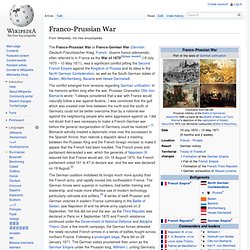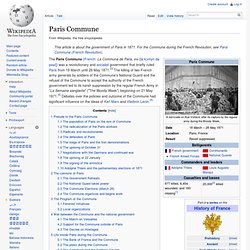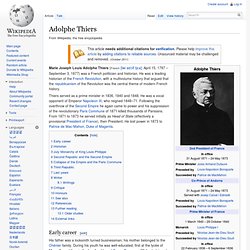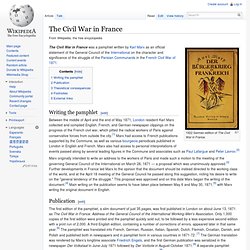

Canut revolts. Major revolts by silk workers in Lyon in France, known collectively as the Canut revolts (French: Révolte des canuts), occurred in 1831, 1834 and 1848. They were among the first well-defined worker uprisings of the period known as the Industrial Revolution. The word Canut was a common term to describe to all Lyonnais silk workers. The Second Canut revolt in 1834 occurred in a prosperous economy that had caused a surge in workers' wages. Owners saw these wages as too high, so they attempted to impose a wage decrease. This combined with laws that oppressed republican groups caused the workers to rebel. A third insurrection occurred in 1848. Franco-Prussian War. The Franco-Prussian War or Franco-German War (German: Deutsch-Französischer Krieg, French: Guerre franco-allemande), often referred to in France as the War of 1870[page needed] (19 July 1870 – 10 May 1871), was a significant conflict pitting the Second French Empire against the Kingdom of Prussia and its allies in the North German Confederation, as well as the South German states of Baden, Württemberg, Bavaria and Hesse-Darmstadt.

The conflict emerged from tensions regarding German unification. In his memoirs written long after the war, Prussian Chancellor Otto Von Bismarck wrote: "I always considered that a war with France would naturally follow a war against Austria...I was convinced that the gulf which was created over time between the north and the south of Germany could not be better overcome than by a national war against the neighboring people who were aggressive against us. Causes[edit] Opposing forces[edit] Under Marshal Adolphe Niel, urgent reforms were made. Siege of Paris. National Guard (France) The National Guard (French: la Garde nationale) was the name given at the time of the French Revolution to the militias formed in each city, in imitation of the National Guard created in Paris. It was a military force separate from the regular army. Initially under the command of the Marquis de Lafayette, then briefly under the Marquis de Mandat, it was strongly identified until the summer of 1792 with the middle class and its support for constitutional monarchy.
The National Guard had some impact on the Revolution, but was disarmed by Napoleon except for its recall in 1809 and 1814 to help defend France. Reestablished after his exile, it continued to play a significant role in each French revolution of the 19th century. Paris Commune. The Paris Commune (French: La Commune de Paris, IPA: [la kɔmyn də paʁi]) was a revolutionary and socialist government that briefly ruled Paris from 18 March until 28 May 1871.[3] The killing of two French army generals by soldiers of the Commune's National Guard and the refusal of the Commune to accept the authority of the French government led to its harsh suppression by the regular French Army in "La Semaine sanglante" ("The Bloody Week") beginning on 21 May 1871.[4] Debates over the policies and outcome of the Commune had significant influence on the ideas of Karl Marx and Vladimir Lenin.[5] Prelude to the Paris Commune[edit] On 2 September 1870, after his unexpected defeat at the Battle of Sedan in the Franco-Prussian War, Emperor Louis Napoleon III surrendered to the Prussian Chancellor, Otto von Bismarck.

Adolphe Thiers. Marie Joseph Louis Adolphe Thiers (French: [lwi adɔlf tjɛʁ]; April 15, 1797 – September 3, 1877) was a French politician and historian.

He was a leading historian of the French Revolution, with a multivolume history that argued that the republicanism of the Revolution was the central theme of modern French history. Thiers served as a prime minister in 1836, 1840 and 1848. He was a vocal opponent of Emperor Napoleon III, who reigned 1848–71. Following the overthrow of the Second Empire he again came to power and his suppression of the revolutionary Paris Commune of 1871 killed thousands of Parisians. From 1871 to 1873 he served initially as Head of State (effectively a provisional President of France), then President. Early career[edit] His father was a locksmith turned businessman; his mother belonged to the Chénier family. Historian[edit] With his active pen he became well known in Liberal circles. July Monarchy of King Louis-Philippe[edit] Thiers as a young man Adolphe Thiers.
The Civil War in France. 1922 German edition of The Civil War in France.

The Civil War in France was a pamphlet written by Karl Marx as an official statement of the General Council of the International on the character and significance of the struggle of the Parisian Communards in the French Civil War of 1871. Writing the pamphlet[edit] Between the middle of April and the end of May 1871, London resident Karl Marx collected and compiled English, French, and German newspaper clippings on the progress of the French civil war, which pitted the radical workers of Paris against conservative forces from outside the city.[1] Marx had access to French publications supported by the Commune, as well as various bourgeois periodicals published in London in English and French.
Marx also had access to personal interpretations of events passed along by several leading figures in the Commune and associates such as Paul Lafargue and Peter Lavrov.[2] Publication[edit] Theoretical consequences[edit]